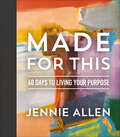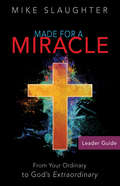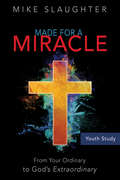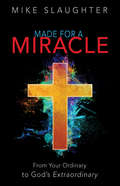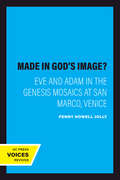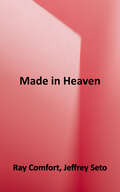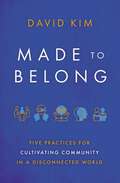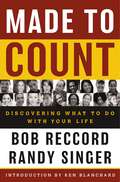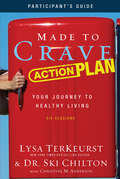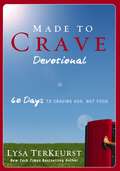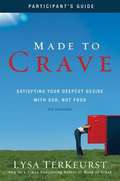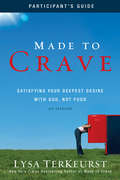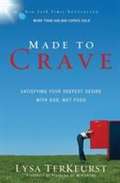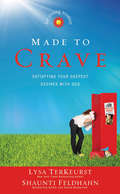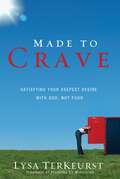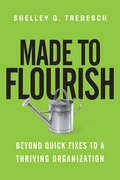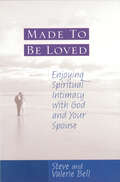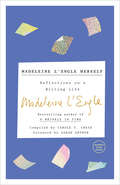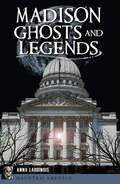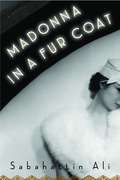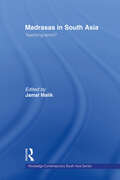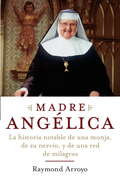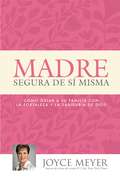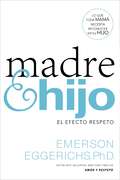- Table View
- List View
Made for This: 40 Days to Living Your Purpose
by Jennie AllenHave you ever asked yourself, &“Why am I here?&” Recognize your calling, find your place of service, and follow God to a life of purpose.This 40-day journey is for you—and it might surprise you. What if God hasn&’t hidden His purposes for your life from you? That life doesn&’t have to be so exhausting and heavy and confusing all the time? That God has given you everything you need to live out the calling He has placed on your life right this minute as you read this?In Made for This, a beautiful blend of bestselling books Anything and Restless, join Bible teacher Jennie Allen on a 40-day interactive journey that takes you through a step-by-step process to guide you in answering life&’s ultimate question.This unique book will help you:Stop living afraid and insecure by discovering how God can use your dreams and passions for a greater purposeIdentify the threads in your life and how they intentionally weave together Trade control and safety for a life of God-honoring adventure by praying one prayerDiscover how to fully surrender to God and identify the threads of gifts, passions, places, relationships, and sufferings in your life—not to get what you want, but to find what God wants of you.
Made for a Miracle Leader Guide: From Your Ordinary to God's Extraordinary (Made for a Miracle)
by Mike SlaughterPopular author and pastor Mike Slaughter examines the two components of every miracle: divine action and human responsibility. For a real miracle to take place, we must act with God, using whatever gifts, talents, and abilities we have and directing them toward God’s work. We need to follow the examples of Mary in the birth of Jesus, Jesus’ followers when he healed them, and Jesus’ disciples after he rose from the dead.The Leader Guide contains everything needed to guide a group through the six-week study including session plans, activities, and discussion questions, as well as multiple format options.
Made for a Miracle Youth Study Book: From Your Ordinary to God's Extraordinary (Made for a Miracle)
by Mike SlaughterPopular author and pastor Mike Slaughter examines the two components of every miracle: divine action and human responsibility. For a real miracle to take place, we must act with God, using whatever gifts, talents, and abilities we have and directing them toward God's work. We need to follow the examples of Mary in the birth of Jesus, Jesus' followers when he healed them, and Jesus' disciples after he rose from the dead. This Youth Study Book takes the ideas presented in Mike Slaughter’s book and interprets them for young people grades 6-12.
Made for a Miracle: From Your Ordinary to God's Extraordinary (Made for a Miracle)
by Mike SlaughterAt some time in our lives, most of us have prayed for or hoped for a miracle—an event that seems impossible but is brought about by God's transcendent power. But when miracles occur, did you know that you have a role to play?If that's true, what's the catch? What do we have to do? What's it going to cost us?Popular author and pastor Mike Slaughter examines the two components of every miracle: divine action and human responsibility. For a real miracle to take place, we must act with God, using whatever gifts, talents, and abilities we have and directing them toward God’s work. We need to follow the examples of Mary in the birth of Jesus, Jesus’ followers when he healed them, and Jesus’ disciples after he rose from the dead.This Lent, use your God-given gifts and talents for God’s glory, and get ready to be made for a miracle.Additional components for this six-week study include a comprehensive Leader Guide and a DVD featuring author and pastor Mike Slaughter.
Made in God's Image?: Eve and Adam in the Genesis Mosaics at San Marco, Venice (The Discovery Series #4)
by Penny Howell JollyThis title is part of UC Press's Voices Revived program, which commemorates University of California Press’s mission to seek out and cultivate the brightest minds and give them voice, reach, and impact. Drawing on a backlist dating to 1893, Voices Revived makes high-quality, peer-reviewed scholarship accessible once again using print-on-demand technology. This title was originally published in 1997.This title is part of UC Press's Voices Revived program, which commemorates University of California Press’s mission to seek out and cultivate the brightest minds and give them voice, reach, and impact. Drawing on a backlist dating to 1893, Voices Revived</DIV
Made in Heaven: Man's Indiscriminate Stealing of God's Amazing Design
by Ray Comfort Jeffrey SetoEngineers have long examined God's creation to understand and mimic complex, proven mechanics of design. They have plumbed the depths of the natural world, encompassing insects and plants to man in search of wisdom and insight. The simplicity yet intricacy of how God designs work and how He manufacturers complexity in nature astounds and inspires engineers in hypothesis and designs that could not be formed otherwise.
Made to Belong: Five Practices for Cultivating Community in a Disconnected World
by David KimAuthor and pastor David Kim shares his experiences with loneliness as a Korean American immigrant and delivers compelling research about belonging that includes the revolutionary five anchors for developing meaningful relationships.Even though we are connected more than ever--through social media, video calls and texts, and advanced travel opportunities--we're also drowning in loneliness and isolation. As discipleship pastor of WestGate Church in Silicon Valley, David Kim decided to research the reasons why--and uncovered surprising answers.When Kim moved to America from South Korea as a child, he experienced isolation during his school years. Differences in language, food, and culture spiked an immense desire for an accepting, supportive community. As an adult, he read widely about belonging, and in his survey of more than 1,300 Christians, he discovered that the number-one struggle shared by them is loneliness. Left to ourselves, Kim says, we naturally drift away from God and others, and we begin to believe the lies of the enemy: You are all alone. No one else feels this way. No one cares about you. How could they? God has abandoned you. You were just imagining things before.In Made to Belong, Kim combats those lies with the incredible hope found in the revolutionary Five Practices for Meaningful Connection: Priority: People first, no regrets.Chemistry: What, you too?Vulnerability: Dangerously safe.Empathy: I hear and see you.Accountability: I can't carry it, but I can carry you.True belonging takes intentional effort, but Kim reminds us that we are made to belong--to each other and to Jesus. Through sound wisdom from the Bible, proven research from the social sciences and his own data, and examples from his pastoral ministry and moving personal anecdotes, Kim shows us that we are uniquely designed by God to belong to one another for our flourishing.
Made to Count: Discovering What to Do with Your Life
by Bob ReccordWe all desperately want to leave a positive imprint on the world. We want to leave things and people better than we found them - to be remembered well. And so, we dread the idea that, in the end, our lives might not count for much. Made to Count drives straight to the heart of that fear of failure. It will help you discover your God-designed purpose - to find your life's true meaning and live your life's greatest passion. Using eight powerful biblical principles that are revolutionizing people's lives, as well as the fascinating stories of those changed by them, Reccord and Singer teach you how to hear God's call and discover His specific plan for you. These principles transcend time, cultures, and occupations. They are broadly universal and, yet, individually unique. This astonishing book can change your life . . . then you can change your world. Read it now and discover the potential you have to make a significant difference in the world - how you have been divinely made to count.
Made to Crave Action Plan Participant's Guide: Your Journey to Healthy Living
by Lysa Terkeurst Christine Anderson Ski ChiltonAccording to New York Times bestselling author Lysa TerKeurst, craving isn’t a bad thing, but we must realize God created us to crave so we’d ultimately desire more of Him in our lives. Many of us have misplaced that craving, overindulging in physical pleasures instead of lasting spiritual satisfaction. Made to Crave Action Plan—a follow-up curriculum to Made to Crave—will help women implement a long-term plan of action for healthy living. In this six-session video-based study, women will be encouraged by Bible teaching from Lysa, uplifted by testimonies from women like Christian music chart-topper Mandisa, and empowered with healthy living tips from Dr. Ski Chilton, an expert in molecular medicine. This curriculum will help women who found their “want to” by participating in the Made to Crave study master the “how to” of living a healthy physical life as well as cultivate a rich and full relationship with God. Made to Crave Action Plan gives women of all ages Biblical encouragement for both their physical and spiritual journeys plus healthy living tips for use in their everyday lives. Designed for use with the video.
Made to Crave Devotional: 60 Days to Craving God, Not Food
by Lysa TerkeurstLast year, author Lysa TerKeurst released the book Made to Crave, providing the Biblical answer to why people diet, regain the weight they lose, and continue to find themselves stuck in this vicious cycle. Made to Crave helped thousands of people finally achieve victory in their weight loss journey. But, according to TerKeurst, "We need more than 19 chapters to stay motivated and on track. That's why I wrote this daily devotional with 60 inspirational entries. There is plenty of new material not in the original book. Rest assured, I also included your favorite nuggets of wisdom from Made to Crave." Just like the Made to Crave book, this Made to Crave Devotional is not a how-to get healthy book. It is the road to finding the lasting 'want to' that extends far beyond the surface issues of weighing less and wanting to wear a smaller clothes size. Says TerKeurst: "There's a spiritual battle going on. It's real. And it's amazing how perfectly the Bible gives us specific ways to find victory with our food struggles. "Even for girls who don't crave carrots."
Made to Crave Participant's Guide: Satisfying Your Deepest Desire with God, Not Food
by Lysa TerkeurstAccording to bestselling author Lysa TerKeurst, craving isn't a bad thing, but we must realize God created us to crave so we'd ultimately desire more of Him in our lives. Many of us have misplaced that craving, overindulging in physical pleasures instead of lasting spiritual satisfaction. For a woman struggling with unhealthy eating habits, Made to Crave will equip her to:* Break the 'I'll start again Monday cycle' and start feeling good about herself today* Stop beating herself up over the numbers on the scale and make peace with the body you've been given* Discover how weight loss struggles aren't a curse but, rather, a blessing in the making* Replace justifications that lead to diet failure with empowering go-to scripts that lead to victory* Eat healthy without feeling deprived* Reach a healthy weight goal while growing closer to God through the processMade to Crave session titles include:Session 1: From Deprivation to EmpowermentSession 2: From Desperation to DeterminationSession 3: From Guilt to PeaceSession 4: From Triggers to Truth Session 5: From Permissible to BeneficialSession 6: From Consumed to CourageousBonus Session: Moving the MountainThe Made to Crave Participant's Guide is designed for use with the Made to Crave DVD.
Made to Crave Participant's Guide: Satisfying Your Deepest Desire with God, Not Food
by Lysa TerkeurstAccording to bestselling author Lysa TerKeurst, craving isn’t a bad thing, but we must realize God created us to crave so we’d ultimately desire more of Him in our lives. Many of us have misplaced that craving, overindulging in physical pleasures instead of lasting spiritual satisfaction. For a woman struggling with unhealthy eating habits, Made to Crave will equip her to: Break the “I’ll start again Monday cycle” and start feeling good about herself today Stop beating herself up over the numbers on the scale and make peace with the body you’ve been given Discover how weight loss struggles aren’t a curse but, rather, a blessing in the making Replace justifications that lead to diet failure with empowering go-to scripts that lead to victory Eat healthy without feeling deprived Reach a healthy weight goal while growing closer to God through the process Designed for use with the video.
Made to Crave: Satisfying Your Deepest Desire with God, Not Food
by Lysa TerkeurstMade to Crave is the missing link between a woman's desire to be healthy and the spiritual empowerment necessary to make that happen. The reality is we were made to crave. Craving isn't a bad thing. But we must realize God created us to crave more of him. Many of us have misplaced that craving by overindulging in physical pleasures instead of lasting spiritual satisfaction. If you are struggling with unhealthy eating habits, you can break the 'I'll start again Monday' cycle, and start feeling good about yourself today. Learn to stop beating yourself up over the numbers on the scale. Discover that your weight loss struggle isn't a curse but rather a blessing in the making, and replace justifications that lead to diet failure with empowering go-to scripts that lead to victory. You can reach your healthy weight goal -- and grow closer to God in the process. This is not a how-to book. This is not the latest and greatest dieting plan. This book is the necessary companion for you to use alongside whatever healthy lifestyle plan you choose. This is a book and Bible study to help you find the 'want to' in making healthy lifestyle choices.
Made to Crave: Satisfying Your Deepest Desire with God, Not Food
by Lysa TerkeurstMade to Crave is the missing link between a woman’s desire to be healthy and the spiritual empowerment necessary to make that happen. The reality is we were made to crave. Craving isn’t a bad thing. But we must realize God created us to crave more of him. Many of us have misplaced that craving by overindulging in physical pleasures instead of lasting spiritual satisfaction. If you are struggling with unhealthy eating habits, you can break the “I’ll start again Monday” cycle, and start feeling good about yourself today. Learn to stop beating yourself up over the numbers on the scale. Discover that your weight loss struggle isn’t a curse but rather a blessing in the making, and replace justifications that lead to diet failure with empowering go-to scripts that lead to victory. You can reach your healthy weight goal – and grow closer to God in the process. This is not a how-to book. This is not the latest and greatest dieting plan. This book is the necessary companion for you to use alongside whatever healthy lifestyle plan you choose. This is a book and Bible study to help you find the "want to" in making healthy lifestyle choices.
Made to Crave: Satisfying Your Deepest Desire with God, Not Food
by Lysa TerkeurstMade to Crave is the missing link between a woman's desire to be healthy and the spiritual empowerment necessary to make that happen. The reality is we were made to crave. Craving isn't a bad thing. But we must realize God created us to crave more of him. Many of us have misplaced that craving by overindulging in physical pleasures instead of lasting spiritual satisfaction. If you are struggling with unhealthy eating habits, you can break the "I'll start again Monday" cycle, and start feeling good about yourself today. Learn to stop beating yourself up over the numbers on the scale. Discover that your weight loss struggle isn't a curse but rather a blessing in the making, and replace justifications that lead to diet failure with empowering go-to scripts that lead to victory. You can reach your healthy weight goal - and grow closer to God in the process. This is not a how-to book. This is not the latest and greatest dieting plan. This book is the necessary companion for you to use alongside whatever healthy lifestyle plan you choose. This is a book and Bible study to help you find the "want to" in making healthy lifestyle choices.
Made to Flourish: Beyond Quick Fixes to a Thriving Organization
by Shelley G. TrebeschEvery organization is made to flourish. But when problems arise, quick fixes and poor leadership training can drag it down. The key to a thriving team is to look below the surface at the hidden dynamics that can cause it to lose focus, turn inward or even cease to exist. Budget problems, personality conflicts, mission drift, government regulations—all these and more can tempt us to respond rapidly and superficially. Shelley Trebesch offers leaders the tools needed to develop practical solutions that actually work. She provides a model for getting a firm hold on the complexities inherent in any team. Diagrams help readers visualize key dynamics while vivid case studies illustrate how to put the book into practice. Here is the book that gives churches, NGOs, mission agencies, parachurch groups, other nonprofits, businesses and teams within these groups what they need. Trebesch charts the path to the life-giving, holistic, fruitful abundance that God intended for organizations and everyone in them.
Made to be Loved: Enyoying Spiritual Intimacy with God and Your Spouse
by Stephen B. Bell Valerie BellWhile desired, the idea of spiritual intimacy is scary and even threatening to some couples. They've tried those other couples devotional books, but sharing Bible study and prayer time together just doesn't come naturally. And when these sharing times seem awkward and manipulated, many couples put the book back on the shelf and simply go on as they were before. If this sounds all too familiar, Made to Be Loved is the sip of cool water for your thirsty marriage. Steve and Valerie Bell encourage couples to go beyond treating the symptoms of a marriage that lacks spiritual intimacy and go straight to the root of the problem. The real disease that threatens marriages is spiritual distance from God. According to the Bells, "when a husband and wife invite God into their marriage, their perspectives change. Hearts are softened, expectations become more realistic, sexual relations take on a soulish sweetness, even fights get better!" Take your marriage to the next level with the help of Steve and Valerie Bell. Develop a deeper love relationship with you God, and in doing so, create a whole new atmosphere in your marriage.
Made to be Loved: Enyoying Spiritual Intimacy with God and Your Spouse
by Stephen B. Bell Valerie BellWhile desired, the idea of spiritual intimacy is scary and even threatening to some couples. They've tried those other couples devotional books, but sharing Bible study and prayer time together just doesn't come naturally. And when these sharing times seem awkward and manipulated, many couples put the book back on the shelf and simply go on as they were before. If this sounds all too familiar, Made to Be Loved is the sip of cool water for your thirsty marriage. Steve and Valerie Bell encourage couples to go beyond treating the symptoms of a marriage that lacks spiritual intimacy and go straight to the root of the problem. The real disease that threatens marriages is spiritual distance from God. According to the Bells, "when a husband and wife invite God into their marriage, their perspectives change. Hearts are softened, expectations become more realistic, sexual relations take on a soulish sweetness, even fights get better!" Take your marriage to the next level with the help of Steve and Valerie Bell. Develop a deeper love relationship with you God, and in doing so, create a whole new atmosphere in your marriage.
Madeleine L'Engle Herself: Reflections on a Writing Life
by Madeleine L'EngleThe author of over fifty books, including Newbery Award winner A Wrinkle in Time, Madeleine L'Engle is internationally acclaimed for her literary skills and her ability to translate intangible things of the spirit-- both human and divine--into tangible concepts through story. In Madeleine L'Engle Herself: Reflections on a Writing Life, you'll find hundreds of this celebrated author's most insightful, illuminating, and transforming statements about writing, creativity, and truth.INCLUDES NEVER-BEFORE-PUBLISHED MATERIAL FROML'ENGLE'S WORKSHOPS AND SPEECHES.
Madison Ghosts and Legends (Haunted America)
by Anna LardinoisWisconsin's capital city is haunted! From restless spirits roaming the University of Wisconsin to ghostly Confederate soldiers lingering at Camp Randall Stadium, Madison is filled with otherworldly entities. Spirits do not rest in peace at Taliesin, and the tragedies that occurred on the Capitol grounds shed light on the building's numerous paranormal reports. The city's outskirts are just as eerie. From the prowling Beast of Bray Road to what is thought to be Wisconsin's most haunted bar, a spinetingling location is never far away.Join author Anna Lardinois to discover some of Madison's most macabre tales.
Madonna in a Fur Coat
by Ureen Freely Alexander Dawe Sabahattin Ali<P>Available in English for the first time, this best-selling Turkish classic of love and alienation in a changing world captures the vibrancy of interwar Berlin. <P>A shy young man leaves his home in rural Turkey to learn a trade and discover life in 1920s Berlin. <P>There, amidst the city’s bustling streets, elegant museums, passionate politics, and infamous cabarets, a chance meeting with a beautiful half-Jewish artist transforms him forever. <P>Caught between his desire for freedom from tradition and his yearning to belong, he struggles to hold on to the new life he has found with the woman he loves. <P>Emotionally powerful, intensely atmospheric, and touchingly profound, Madonna in a Fur Coat is an unforgettable novel about new beginnings, the relentless pull of family ties, and the unfathomable nature of the human soul. <P> First published in 1943, this novel, with its quiet yet insistent defiance of social norms, has been topping best-seller lists in Turkey since 2013.
Madrasas in South Asia: Teaching Terror? (Routledge Contemporary South Asia Series)
by Jamal MalikAfter 9/11, madrasas have been linked to international terrorism. They are suspected to foster anti-western, traditionalist or even fundamentalist views and to train al-Qaeda fighters. This has led to misconceptions on madrasa-education in general and its role in South Asia in particular. Government policies to modernize and ‘pacify’ madrasas have been precipitous and mostly inadequate. This book discusses the educational system of madrasas in South Asia. It gives a contextual account of different facets of madrasa education from historical, anthropological, theological, political and religious studies perspectives. Some contributions offer recommendations on possible – and necessary – reforms of religious educational institutions. It also explores the roots of militancy and sectarianism in Pakistan, as well as its global context. Overall, the book tries to correct misperceptions on the role of madrasas, by providing a more balanced discussion, which denies neither the shortcomings of religious educational institutions in South Asia nor their important contributions to mass education.
Madre Angelica
by Raymond ArroyoLa historia extraordinaria de la Madre Angélica, fundadora de la multimillonaria Cadena de Televisión Eternal World y "la católica más influyente de Estados Unidos", según la revista Time. En 1981, un año después de que Ted Turner creara CNN, una sencilla monja, sólo con sus instintos empresariales y doscientos dólares, fundó en el garaje de un monasterio de Birmingham, Alabama, lo que se convertiría en el imperio religioso de medios de difusión más grande del mundo. Bajo su guía, la Cadena de Televisión Eternal World (EWTN) creció a un ritmo asombroso, tanto en número de televidentes como en influencia, hasta el punto de que ahora llega a más de cien millones de televidentes en cientos de países de todo el mundo. Nacida como Rita Rizzo en Canton, Ohio, en 1923, la Madre Angélica fue abandonada por su padre y criada en la pobreza por una madre que padecía de depresión. De joven, Rita sufrió fuertes dolores abdominales que los médicos pensaron que se debían a un "problema de los nervios", pero sus síntomas desaparecieron cuando una mística de su localidad rezó por ella. Al darse cuenta del poder de la oración, Rita juró dedicar su vida a Dios y se hizo monja de clausura, con la esperanza de pasar toda su existencia lejos del mundo. Pero muy pronto, la fe de Rita la impulsó a realizar obras increíbles, desde establecer un monasterio en Alabama hasta dar inicio a la primera cadena católica de televisión por cable. Confiando únicamente en "la providencia de Dios", la Madre Angélica construyó un imperio sin prestar atención a presupuestos ni a campañas de recaudación, y logró lo que ni los más altos prelados de la Iglesia Católica habían logrado hacer.Raymond Arroyo combina su objetividad periodística y su habilidad para captar los detalles en los más de cinco años de entrevistas exclusivas con la Madre Angélica, para traernos esta increíble historia. En su narración, Arroyo sigue el tortuoso ascenso al éxito de la Madre y saca a la luz por primera vez la feroz oposición que ella enfrentó, tanto dentro como fuera de la Iglesia Católica. Esta es una inspiradora historia de supervivencia y una prueba de que la fe de una mujer puede mover mucho más que montañas.From the Trade Paperback edition.
Madre Segura de sí Misma: Como Guiar A Su Familia Con la Fortaleza y la Sabiduria de Dios
by Joyce MeyerEntrenadora, animadora, confidente, cocinera y chofer; la descripcion del trabajo de una madre es tan amplio como el horizonte. Tal vez es por eso que muchas madres luchan con la inseguridad y la incertidumbre, mientras hacen todo lo posible para criar a sus hijos en un mundo exigente y en constante cambio. Si alguna vez ha ido a la cama decepcionada consigo misma, si alguna vez ha sentido como si no diera la talla, o si alguna vez ha deseado que hubiera un manual sobre la maternidad, la autora de exitos de ventas #1 del New York Times, Joyce Meyer, tiene justamente el libro para usted.MADRE DE SI MISMA la animara y sabra que no esta sola; Dios esta con usted y quiere ayudarle con los desafios que enfrenta cada dia. A traves de historias inspiradoras, principios biblicos y las propias lecciones valiosas de la vida de Joyce, no hay duda de que va a descubrir el camino hacia una nueva confianza y alegria en la maternidad. No importa su edad, el tomano de su familia o las condiciones en que se encuentre, MADRE SEGURA DE SI MISMA le ayudara a ser esa madre alegre y confiada que Dios creo para que sea!
Madre e hijo: El efecto respeto
by Dr Emerson EggerichsEl amor es importante, pero el respeto es la clave al corazón de tu hijo. La idea de que las mamás respeten a sus hijos puede sonar ajena para algunos, pero también parece encender curiosidad. Es fácil identificarse con la necesidad que todos sentimos del amor de una madre, pero ¿es eso lo mismo que respeto? Incluso para los niños pequeños, el efecto del respeto no es nada menos que asombroso cuando se aplica apropiadamente. Las mamás desean aprender cualquier cosa que les ayude con sus hijos. Después de todo, aman a sus hijos, pero a muchas de ellas les resulta más difícil criarlos que a las niñas, especialmente desde los cuatro años de edad en adelante. Lo que hace que todo esto sea más urgente es que las mamás están entrenando a los padres para amar a sus hijas, pero nadie ha dicho nada a las mamás sobre cómo mostrar respeto a sus hijos, al menos no de una forma que sea aplicable y completamente explicada. Todos entienden que las niñas pequeñas necesitan el amor de papá, pero ¿quién está promocionando con fuerza la verdad de que los niños pequeños (y los grandes) necesitan el respeto de mamá? No es extraño que las madres sientan que no saben nada sobre este tema. Al igual que Emerson Eggerichs transformó millones de relaciones matrimoniales con un entendimiento bíblico del amor y el respeto, ahora dirige esos principios a una de las relaciones más importantes de todas: una madre y su hijo.
